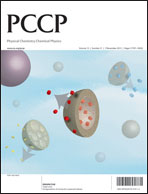Optimal control of molecular fragmentation with homologous families of photonic reagents and chemical substrates†
Abstract
This work investigates laser optimally controlled fragmentation in a series of chemically related halomethane compounds in order to determine the extent to which regular trends in objective yields are observed upon variation of both the laser pulse shape and the chemical substrate. Three control objectives defined by ratios of fragment ions were considered, where families of shaped pulses were found that produced optimal objective yields. For the objective defined by the ratio of a halogen ion to a methyl halide ion, a systematic correlation between the optimal objective yield and chemical composition was revealed. Furthermore, some of the optimal shaped pulses were found to successfully control the same objective in closely related molecular substrates. These results provide a basis to expect systematic chemical responses from optimally shaped laser pulses acting as “photonic reagents” in analogy with the action of traditional chemical reagents.


 Please wait while we load your content...
Please wait while we load your content...